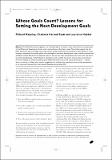| dc.contributor.author | Manning, Richard | en |
| dc.contributor.author | Harland Scott, Charlotte | en |
| dc.contributor.author | Haddad, Lawrence | en |
| dc.date.accessioned | 2016-01-06T15:17:13Z | |
| dc.date.available | 2016-01-06T15:17:13Z | |
| dc.date.issued | Sep-13 | en |
| dc.identifier.citation | Manning, R., Harland Scott, C. and Haddad, L. (2013) Whose Goals Count? Lessons for Setting the Next Development Goals. IDS Bulletin 44(5?6): 1-9 | en |
| dc.identifier.issn | 1759-5436 | en |
| dc.identifier.uri | https://opendocs.ids.ac.uk/opendocs/handle/20.500.12413/7450 | |
| dc.description.abstract | This IDS Bulletin brings together a set of articles about the lessons to be learned from the experience of the Millennium Development Goals, with a strong focus on Southern voices. The articles suggest that the MDG framework has had modest real world traction except where international aid has been significant. It has however successfully focused the global policy spotlight on some key development issues, and also improved the availability of data. But the Goals may have been too narrow, too often interpreted in silos, too much ‘top?down’, too little representative of the Millennium Declaration, and too little focused on the economic environment. A central message for those considering post?2015 frameworks is to ensure strong participation –‘nothing about us without us’. Many other specific suggestions are made for the overall structure and the key elements of an improved framework for international objective?setting after 2015. | en |
| dc.format.extent | 9 | en |
| dc.publisher | Blackwell Publishing Ltd | en |
| dc.relation.ispartofseries | IDS Bulletin Vol. 44 Nos. 5?6 | en |
| dc.rights.uri | http://www.ids.ac.uk/files/dmfile/IDSOpenDocsStandardTermsOfUse.pdf | en |
| dc.title | Whose Goals Count? Lessons for Setting the Next Development Goals | en |
| dc.type | Article | en |
| dc.rights.holder | © 2013 The Authors. IDS Bulletin © 2013 Institute of Development Studies | en |
| dc.identifier.doi | 10.1111/1759-5436.12049 | en |

